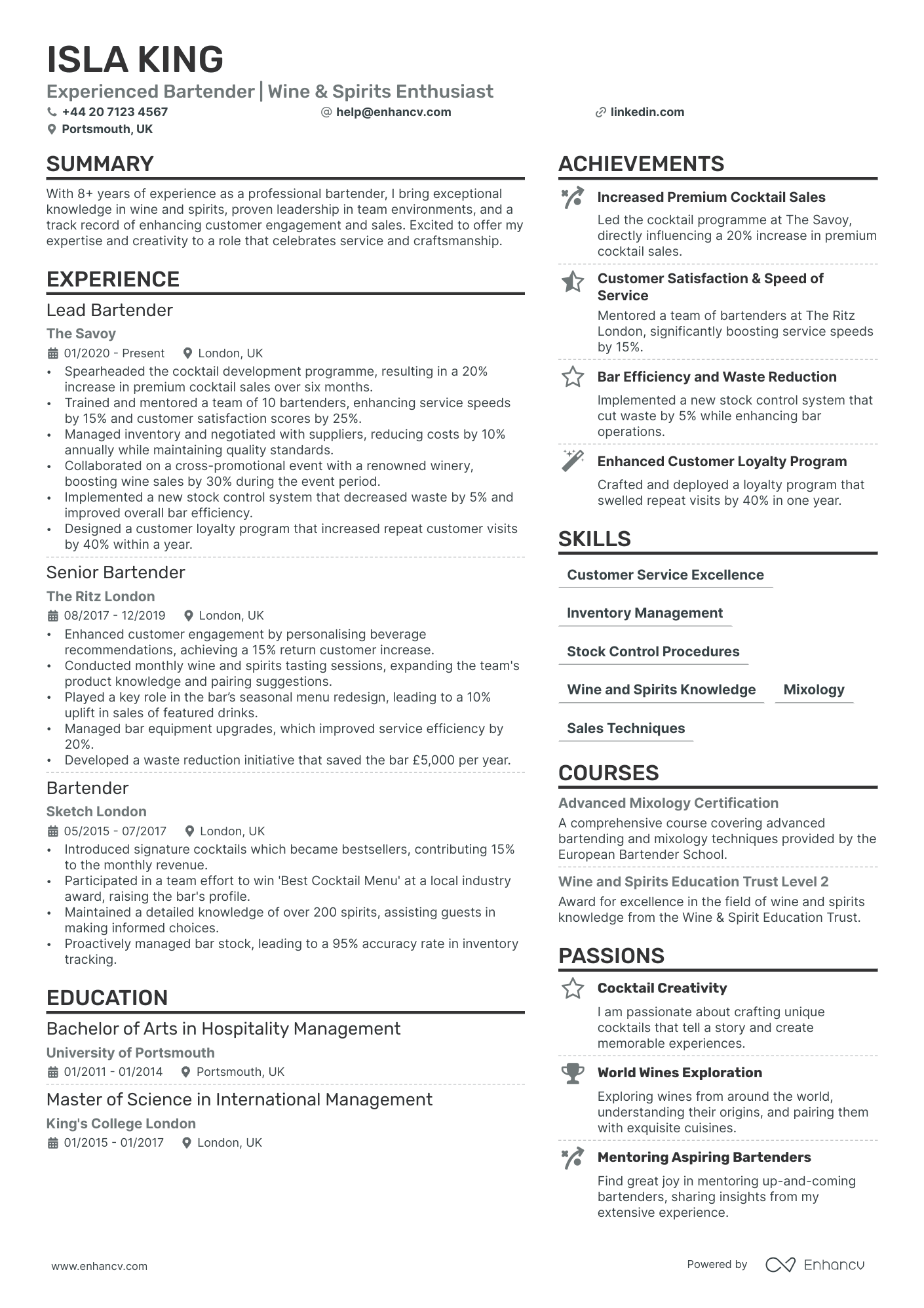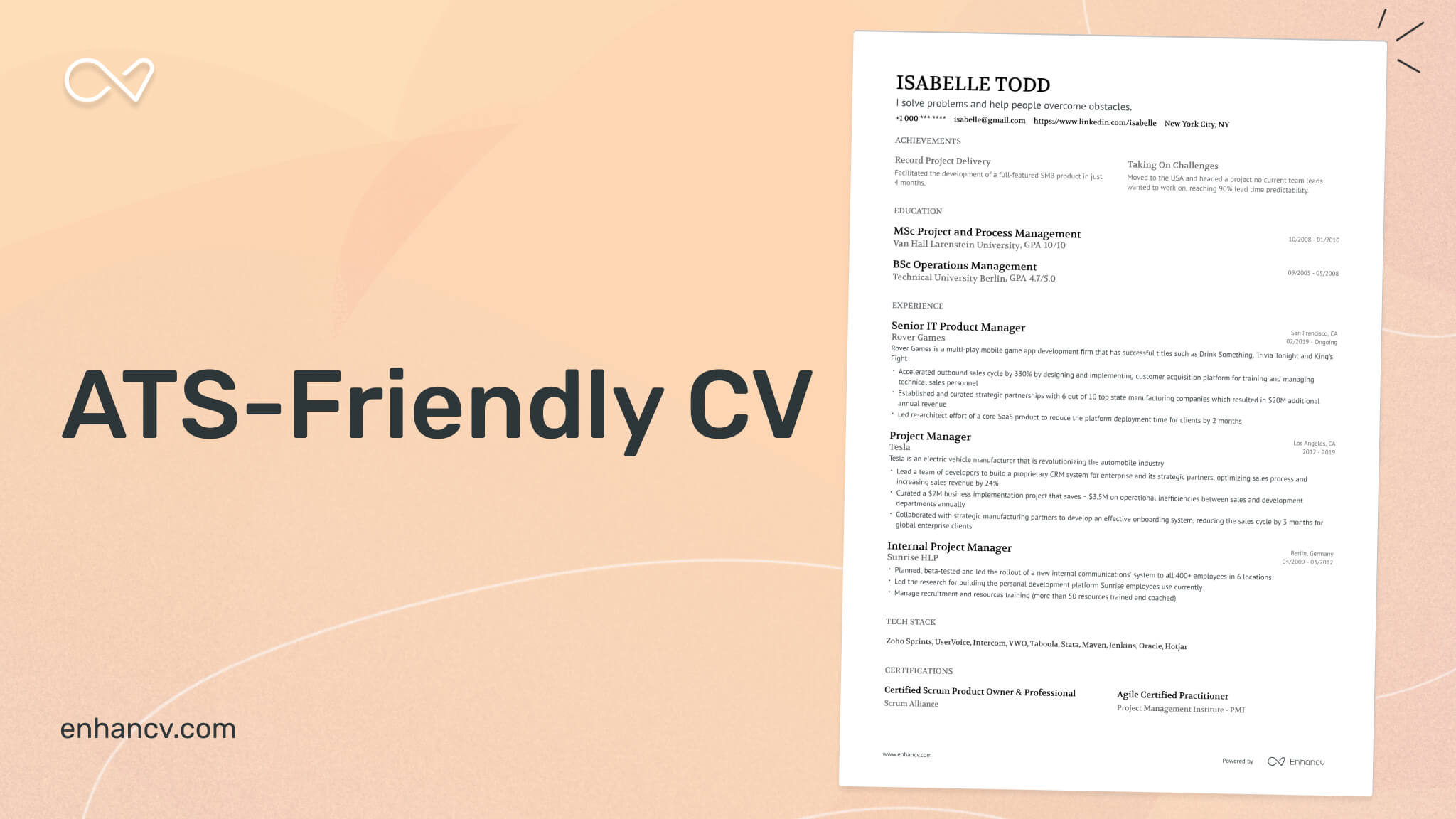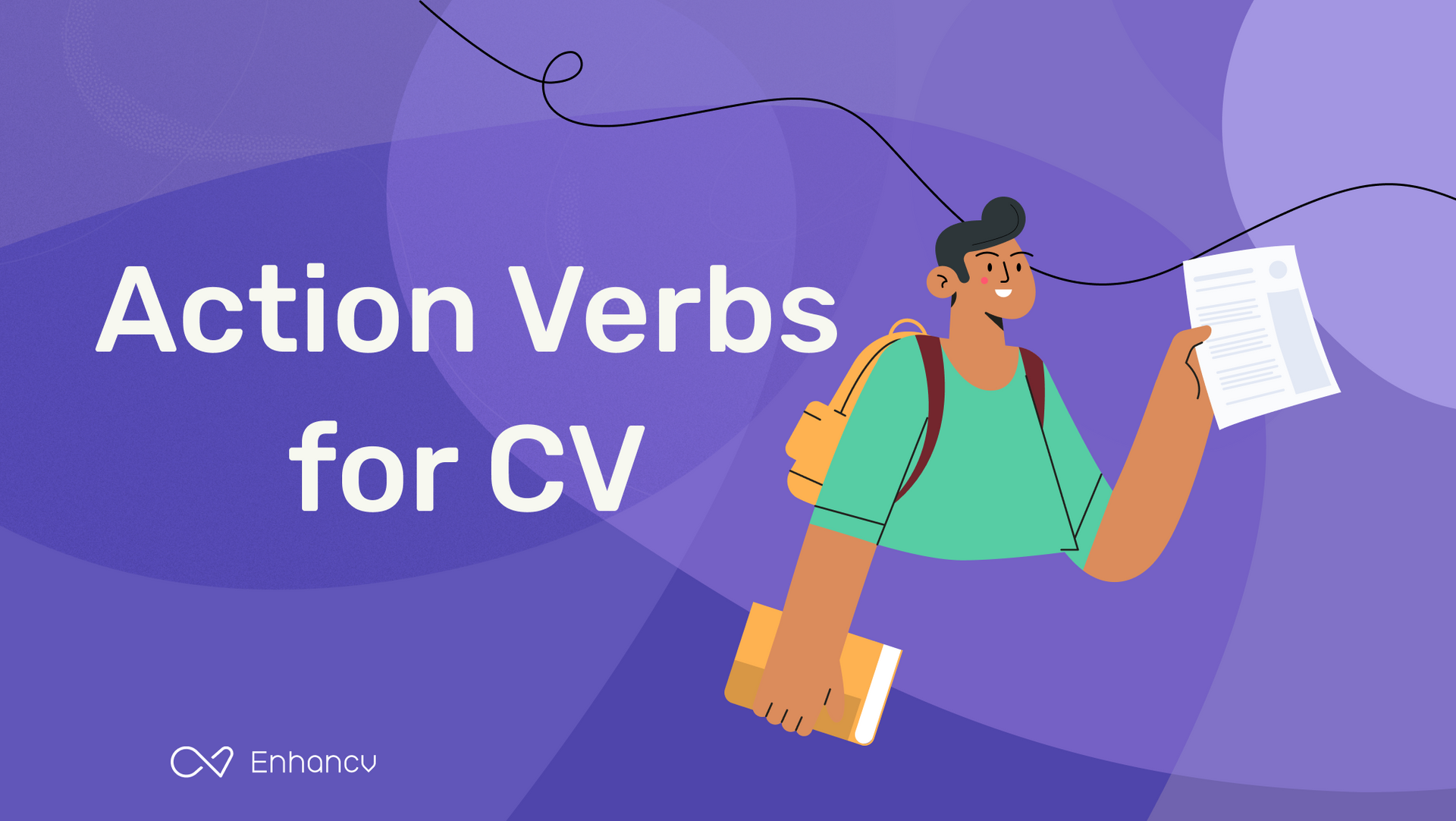Crafting a CV that highlights your mixology skills and customer service expertise can be daunting. Our guide provides tailored advice to showcase your bartending talents effectively, ensuring your application stands out to potential employers.
- Answer job requirements with your bartender CV and experience;
- Curate your academic background and certificates, following industry-leading CV examples;
- Select from +10 niche skills to match the ideal candidate profile
- Write a more succinct experience section that consists of all the right details.
Do you need more specific insights into writing your bartender CV? Our guides focus on unique insights for each individual role:
How to ensure your profile stands out with your bartender CV format
It's sort of a Catch 22. You want your bartender CV to stand out amongst a pile of candidate profiles, yet you don't want it to be too over the top that it's unreadable. Where is the perfect balance between your CV format simple, while using it to shift the focus to what matters most. That is - your expertise. When creating your bartender CV:- list your experience in the reverse chronological order - starting with your latest roles;
- include a header with your professional contact information and - optionally - your photograph;
- organise vital and relevant CV sections - e.g. your experience, skills, summary/ objective, education - closer to the top;
- use no more than two pages to illustrate your professional expertise;
- format your information using plenty of white space and standard (2.54 cm) margins, with colours to accent key information.
Once you've completed your information, export your bartender CV in PDF, as this format is more likely to stay intact when read by the Applicant Tracker System or the ATS. A few words of advice about the ATS - or the software used to assess your profile:
- Generic fonts, e.g. Arial and Times New Roman, are ATS-compliant, yet many candidates stick with these safe choices. Ensure your CV stands out by using a more modern, and simple, fonts like Lato, Exo 2, Volkhov;
- All serif and sans-serif fonts are ATS-friendly. Avoid the likes of fancy decorative or script typography, as this may render your information to be illegible;
- Both single- and double-column formatted CVs could be assessed by the ATS;
- Integrating simple infographics, icons, and charts across your CV won't hurt your chances during the ATS assessment.
PRO TIP
Use bold or italics sparingly to draw attention to key points, such as job titles, company names, or significant achievements. Overusing these formatting options can dilute their impact.
The top sections on a bartender CV
- Professional summary showcases your bartending experience and skills.
- Work experience highlights your history in the hospitality industry.
- Bartending certifications display formal training and qualifications.
- Customer service abilities demonstrate your interpersonal skills.
- Mixology expertise indicates your knowledge of cocktail preparation.
What recruiters value on your CV:
- Highlight your knowledge of mixology and the ability to craft a wide range of drinks, including classic cocktails and innovative creations, emphasising any specialised training or certification you have acquired.
- Demonstrate your customer service skills by detailing your experience in creating a welcoming atmosphere, managing customer expectations, and adeptly handling challenging situations with patrons.
- Showcase your physical stamina and ability to work in a fast-paced environment, mentioning your experience in high-volume establishments or during peak hours, which is essential for a bartender's role.
- Include any experience with inventory management and your proficiency in using point-of-sale systems, as these are critical skills for maintaining stock levels and processing transactions efficiently.
- Mention any awards or recognitions you have received for your bartending skills, which can set you apart and show potential employers your commitment to excellence in the industry.
Recommended reads:
Tips and tricks on writing a job-winning bartender CV header
The CV header is the space which most recruiters would be referring most often to, in the beginning and end of your application. That is as the CV header includes your contact details, but also a headline and a professional photo. When writing your CV header:
- Double-check your contact details for spelling errors or if you've missed any digits. Also, ensure you've provided your personal details, and not your current work email or telephone number;
- Include your location in the form of the city and country you live in. If you want to be more detailed, you can list your full address to show proximity to your potential work place;
- Don't include your CV photo, if you're applying for roles in the UK or US, as this may bias initial recruiters' assessments;
- Write a professional headline that either integrates the job title, some relevant industry keywords, or your most noteworthy achievement.
In the next part of our guide, we'll provide you with professional CVs that showcase some of the best practices when it comes to writing your headline.
Examples of good CV headlines for bartender:
- Senior Lead Bartender | Craft Cocktail Specialist | WSET Level 2 | 10+ Years in Hospitality
- Cocktail Mixologist | Menu Development Expert | Flair Bartending Competitor | 5 Years' Experience
- Bar Supervisor | Customer Service Excellence | SCA Coffee Certified | Bartending Trainer | 8 Years
- Head Bartender | High-Volume Venue Expertise | Inventory Management Pro | Cicerone® Certified | 7 Years
- Junior Bartender | Enthusiastic Team Player | Emerging Trends Aficionado | 2+ Years Behind the Bar
- Bartender & Barista | Dual-Skill Professional | Exceptional Product Knowledge | Hospitality Management | 6 Years' Experience
Your bartender CV introduction: selecting between a summary and an objective
bartender candidates often wonder how to start writing their resumes. More specifically, how exactly can they use their opening statements to build a connection with recruiters, showcase their relevant skills, and spotlight job alignment. A tricky situation, we know. When crafting you bartender CV select between:
- A summary - to show an overview of your career so far, including your most significant achievements.
- An objective - to show a conscise overview of your career dreams and aspirations.
Find out more examples and ultimately, decide which type of opening statement will fit your profile in the next section of our guide:
CV summaries for a bartender job:
- With over 8 years of crafting cocktails in high-volume, prestigious downtown London bars, I offer an extensive knowledge of drinks creation and a proven ability to provide exceptional customer service. Award-winner for cocktail innovation and mixology excellence at the UK Bartenders Guild Awards 2021.
- Seasoned mixologist with a decade of experience working at a beachfront resort in Brighton, renowned for curating an innovative beverage menu that increased seasonal cocktail sales by 30%. Proficient in inventory management and adept at staff training to enhance the overall guest experience.
- A former award-winning sommelier with 5 years of experience transitioning into bartending, I bring a sophisticated understanding of pairing and profound customer engagement techniques, aiming to elevate guests’ experiences in a dynamic bar environment through expertly prepared beverages.
- Experienced customer service manager with 7 years in the hospitality industry seeking to leverage my extensive knowledge of customer satisfaction and venue management into a new career as a bartender, aspiring to bring dedication and an exquisite palate to mixing memorable drinks.
- Keen to apply my passion for mixology and eagerness to learn new skills, I'm seeking an entry-level bartender position where I can harness my strong interpersonal abilities and commitment to high-quality customer service, despite my lack of formal bartending background.
- Eager to embark on my bartending journey, I am ready to bring my enthusiasm for craft cocktails and zeal for customer interaction to the table. My objective is to acquire practical experience while contributing to creating an engaging and vibrant atmosphere for patrons.
Narrating the details of your bartender CV experience section
Perhaps you've heard it time and time again, but, how you present your experience is what matters the most. Your CV experience section - that details your work history alongside your accomplishments - is the space to spotlight your unqiue expertise and talents. So, avoid solely listing your responsibilities, but instead:
- adverts' keywords and integrate those in your experience section;
- Use your CV to detail how you've been promoted in the past by including experience in the reverse chronological order.
Before you start writing your bartender CV experience section, dive into some industry-leading examples on how to structure your bullets.
Best practices for your CV's work experience section
- Maintained expert knowledge of over 50 cocktail recipes and efficiently served them at a busy downtown bar, resulting in a 20% increase in returning customers.
- Developed a signature cocktail menu that boosted the bar’s social media presence and increased weekend sales figures by 30% within three months.
- Managed inventory and restocking of bar supplies, reducing waste by 15% through meticulous tracking and supplier negotiations.
- Implemented a training programme for new bartenders, enhancing team skills and reducing onboarding time by two weeks.
- Consistently provided exemplary customer service in a high-volume establishment, receiving a 95% satisfaction rating on customer feedback surveys.
- Led a bar refurbishment project, selecting ergonomic workstations which reduced staff fatigue and increased operational efficiency.
- Addressed and resolved customer complaints with professionalism and patience, maintaining a positive atmosphere even during peak hours.
- Collaborated with the kitchen staff to pair drinks with menu items, which increased upselling opportunities and average spend per customer.
- Championed a sustainability initiative to utilise locally sourced ingredients and eco-friendly straws, aligning with the company's green ethos and attracting eco-conscious clientele.
- Managed a busy central London cocktail bar, serving up to 300 customers nightly, significantly improving service efficiency by 25%.
- Orchestrated a complete revamp of cocktail menu, introducing 10 new signature drinks, resulting in a 20% upturn in sales over 6 months.
- Instituted a rigorous stock-control system that curtailed shrinkage by 15%, ensuring inventory levels remained consistent with demand patterns.
- Developed and sustained a regular clientele at a high-volume urban pub, with customer satisfaction ratings soaring by 30% under my stewardship.
- Pioneered an employee training programme that empowered bartenders with enhanced mixology skills, contributing to the pub's industry recognition in 2021.
- Efficiently multitasked between bartending, inventory management, and team leadership, managing a staff of 8 during peak periods.
- Implemented a creative seasonal cocktail initiative, which became a major draw and bolstered beverage revenue by 40% during the festive quarters.
- Championed the use of locally sourced ingredients for the bar's offerings, contributing to a 25% reduction in supply costs annually.
- Played a key role in organising weekly live music events, enhancing the establishment's profile and doubling our weekend footfall.
- Strategised and executed promotional campaigns for featured cocktails that escalated monthly sales targets by over 150% consistently.
- Introduced a digital inventory tracking system, cutting down the time spent on stocktaking by 40% and accurately forecasting ordering needs.
- Cultivated a culture of excellent customer service, highlighted by patrons through numerous positive online reviews and a strong repeat customer base.
- Curated a library of over 200 unique cocktail recipes, attracting a diverse clientele and securing the bar’s reputation for innovation.
- Facilitated a collaborative work environment among a team of 5 bartenders, ensuring they met and often exceeded service delivery standards.
- Revitalised a dated spirits collection, sourcing premium and rare bottles that augmented average customer spend by 35%.
- Directed the successful launch of a bespoke cocktail catering service, providing high-quality, tailored experiences for private events, and boosting off-premise sales by 50%.
- Conceived and executed a staff incentive scheme based on upselling, which propelled the monthly sales of premium beverages by 30%.
- Facilitated the integration of a new point-of-sale system that enhanced transaction speeds and improved the overall customer experience.
- Personally responsible for the training and development of a team of 10 bar staff, raising service standards and reducing order errors by 20%.
- Conceptualized and rolled-out limited-time drink specials in collaboration with beverage distributors, sparking renewed interest and a 45% rise in underperforming product lines.
- Negotiated with suppliers to secure better pricing on high-volume liquor orders, effectively decreasing operational costs by 10% across the board.
- Engaged and delighted guests through flair bartending performances, significantly contributing to the vibrant atmosphere and a 15% increase in repeat business.
- Led a sustainability project that minimised waste by implementing recyclable materials and organic waste composting, projecting a positive brand image in the local community.
- Maintained meticulous records which enabled the identification of peak demand trends, streamlining scheduling and inventory preparation.
What to add in your bartender CV experience section with no professional experience
If you don't have the standard nine-to-five professional experience, yet are still keen on applying for the job, here's what you can do:
- List any internships, part-time roles, volunteer experience, or basically any work you've done that meets the job requirements and is in the same industry;
- Showcase any project you've done in your free time (even if you completed them with family and friends) that will hint at your experience and skill set;
- Replace the standard, CV experience section with a strengths or achievements one. This will help you spotlight your transferrable skills that apply to the role.
Recommended reads:
PRO TIP
If applicable, briefly mention a situation where things didn’t go as planned and what you learned from it, demonstrating your ability to learn and adapt.
Describing your unique skill set using both hard skills and soft skills
Your bartender CV provides you with the perfect opportunity to spotlight your talents, and at the same time - to pass any form of assessment. Focusing on your skill set across different CV sections is the way to go, as this would provide you with an opportunity to quantify your achievements and successes. There's one common, very simple mistake, which candidates tend to make at this stage. Short on time, they tend to hurry and mess up the spelling of some of the key technologies, skills, and keywords. Copy and paste the particular skill directly from the job requirement to your CV to pass the Applicant Tracker System (ATS) assessment. Now, your CV skills are divided into:
- Technical or hard skills, describing your comfort level with technologies (software and hardware). List your aptitude by curating your certifications, on the work success in the experience section, and technical projects. Use the dedicated skills section to provide recruiters with up to twelve technologies, that match the job requirements, and you're capable of using.
- People or soft skills provide you with an excellent background to communicate, work within a team, solve problems. Don't just copy-paste that you're a "leader" or excel at "analysis". Instead, provide tangible metrics that define your success inusing the particular skill within the strengths, achievements, summary/ objective sections.
Top skills for your bartender CV:
Mixology
Knowledge of beverage recipes
Inventory management
Point of sale systems
Alcohol safety regulation knowledge
Cocktail preparation
Glassware knowledge
Beverage service
Customer service
Product upselling
Communication
Teamwork
Customer-focused service
Problem-solving
Multitasking
Adaptability
Attention to detail
Stress management
Active listening
Patience
PRO TIP
If there's a noticeable gap in your skillset for the role you're applying for, mention any steps you're taking to acquire these skills, such as online courses or self-study.
CV education and certificates: your academic background as proof of your skill set
A common misconception about your bartender CV education is that you only need it, if you have less professional experience. That is completely false. The CV education section serves to back up your technical (and sometimes personal) capabilities, fill in gaps in your work history, and show you have the initial industry background and know-how. When creating your education section:
- List your degrees in the reverse chronological order, starting with the most recent (and relevant) ones first;
- Include your degree and university names, start and graduation dates. It's optional to also denote you received a "First-Class Honours" for diplomas that are more relevant to the role;
- Curate your relevant university coursework, projects, or thesis work if you happen to have less professional expertise and need to integrate more job keywords and skills.
Your professional qualifications don't need to stop at your academic background. It's advisable to also select up to three of your most noteworthy (and relevant) industry certificates and feature them in a dedicated section. Once more, include the certificate name, the institution that issued it out, and the date you obtained it on. You could feature both hard skills and soft skills certificates, as in the examples below:
PRO TIP
Focus on describing skills in the context of the outcomes they’ve helped you achieve, linking them directly to tangible results or successes in your career.
Recommended reads:
Key takeaways
Impressing recruiters with your experience, skill set, and values starts with your professional bartender CV. Write concisely and always aim to answer job requirements with what you've achieved; furthermore:
- Select a simple design that complements your experience and ensures your profile is presentable;
- Include an opening statement that either spotlights your key achievements (summary) or showcases your career ambitions (objective);
- Curate your experience bullets, so that each one commences with a strong, action verb and is followed up by your skill and accomplishment;
- List your hard and soft skills all across different sections of your CV to ensure your application meets the requirements;
- Dedicate space to your relevant higher education diplomas and your certificates to show recruiters you have the necessary industry background.











